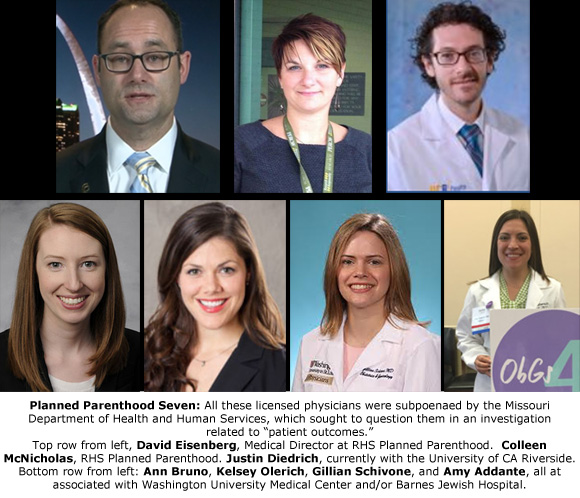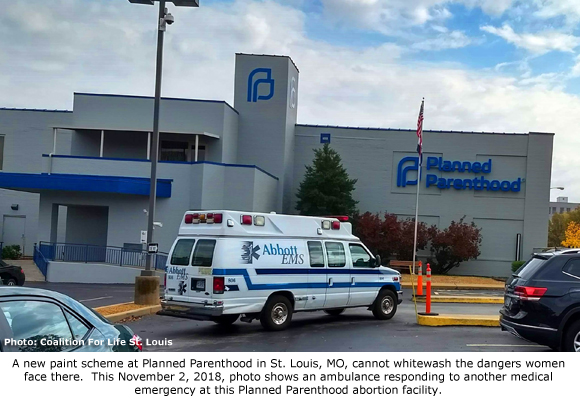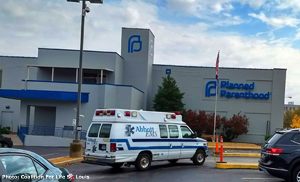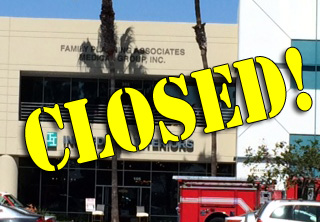RHS Planned Parenthood files a flood of documents with Administrative Hearing Commission

By Cheryl Sullenger
Jefferson City, MO – Reproductive Health Services Planned Parenthood has filed an appeal with the Missouri Administrative Hearing Commission challenging the Department of Health and Senior Services (DHSS) decision to deny the renewal of its abortion facility license.
This removes the case from the St. Louis Circuit Courtroom of Judge Michael Stelzer and places it under the review of AHC Commissioner Sreenivasa Rao Dandamudi, who formerly worked as General Counsel for the State Board of Registration for the Healing Arts and has experience handling medical practitioner cases.
A hearing has been set for 9:00 AM, Thursday, August 1, 2019, at the Wainwright State Office Building, 111 North 7th Street, Room 116, St. Louis, Missouri, with Commissioner Dandamudi presiding. It has been scheduled to last as long as eight hours.
Motion to Stay License Expiration
RHS Planned Parenthood filed a Motion to Stay the decision of the DHSS not to renew its abortion facility license and is asking for an immediate ruling on the stay without a hearing and before the preliminary injunction issued by Circuit Court Judge Michael Stelzer expires at 5:00 p.m. on Friday, June28, 2019. The abortion facility has claimed that that its business, the women of Missouri will be harmed if the facility license is allowed to expire.
On the contrary, expiration of RHS Planned Parenthood’s license would actually protect the women and babies of Missouri from RHS Planned Parenthood’s deficient practices that have resulted in life-threatening conditions currently under investigation by the DHSS.
RHS Planned Parenthood further complained that Residents from Barnes Jewish Hospital and the Family Planning Fellowship, a national abortion training course based in California, which is hosted by Washington University of St. Louis, will not be able to complete their abortion training if a stay is not granted since RHS Planned Parenthood is currently the only abortion facility in the State of Missouri where the trainees are licensed.

“Do we really want the abortionists on staff at the RHS Planned Parenthood, who have hospitalized over seventy women and nearly killed four just a few months ago to be passing on their poor habits to new abortionists? That is an incredibly foolish idea,” asked Troy Newman, President of Operation Rescue. “With abortion clinics shutting down and abortion numbers dropping to record lows, we don’t need more abortionists and women are certainly better off without abortion businesses marketing abortions to them.
March Inspection Report
A glut of exhibits filed in support of the Motion to Stay includes a never-seen Statement of Deficiencies and plans of correction related to a March 11-13, 2019, annual inspection that RHS Planned Parenthood repeatedly failed. Some patient care issues involving serious abortion complications still have not been resolved and are currently under investigation.
The 31-page deficiency report indicated that RHS Planned Parenthood conducts 216 surgical abortions per month. There were 21 women scheduled for abortions on the first day of the 3-day inspection.
[Note: The Statement of Deficiencies at issue in Stelzer’s court was a May 28, 2019 report regarding four women who experienced botched abortions. It is available for viewing here and was not included in the filings.]
Some of the violations cited in the March 13, 2019, deficiency report included:
- Failure to conduct mandatory annual fire drills.
- Failure to conduct mandatory pelvic exams during health assessments 72-hours prior to surgical abortions. (RHS Planned Parenthood insisted upon doing them just prior to abortions. Abortionists were taking it upon themselves to do two pelvic exams on the women, then dishonestly blaming the DHSS for requiring two pelvic exams, which was never in the law. Nevertheless, the DHSS modified the rule last week to allow pelvic exam to be done during the health assessment or just prior to the abortion, if medically indicated.)
- Refusal, as a matter of policy, to conduct mandatory pelvic exams prior to medication abortions, unless abortionists deemed it medically necessary. (RHS Planned Parenthood has ceased all medication abortions rather than comply with this regulation.)
- Failure to have the physician who obtains informed consent also conduct the surgical or medication abortions.
- Failure of Supervising Physicians to complete supervisory notes regarding trainees that conducted abortions.
- Incomplete and/or inaccurate records related to pelvic exams.
- Failure of staff to maintain endotracheal tubes in the event of an emergency.
- Failure to ensure staff were familiar with the location and operation of emergency equipment.
- Failure to develop policies that ensured staff were properly trained in use of emergency equipment.
- Failure to maintain suction equipment for airway use in three of three procedure rooms and in the pre/post-op area.
- The “Emergency Box” contained no suction supplies for clearing airways, such as suction tips and cannulas.
- Inability of staff to locate various emergency supplies related to opening airways in an emergency, and when they were located, they were not properly sterilized.
- Even though one staff physician said they used Laryngeal mask airways (LMA) and kept them on hand in the event of an emergency, there were none in the facility.
- The facility did not have a list of unit emergency supplies and equipment. It had no policy for what equipment was required for the emergency box and had no policies in place to train staff on the location and use of emergency supplies and equipment.
- Even though doors and a pass-through window to the decontamination room were to remain closed at all times to prevent cross-contamination, the inspector observed that one staff person was cleaning equipment in close proximity to the open pass through window and two sterilizers protruded past the door frame preventing the door from closing.
- Failure to ensure the dates and expiring times for various sterilization solutions were recorded and observed. It was noted that one solution was not changed in 19 days, when it expired after 14 days whether it was used or not.
- Failure to maintain a sterilization log that documented times, temperatures, etc. for each load in the autoclave.
- 13 of 26 sterile instrument packages observed did not have a sterilizer or load number identified on the package, and therefore could not be traced to a patient in the event of infection or sterilization failure.
- Multiple incidents of expired supplies.
- Failure to properly maintain controlled substance logs.
Documents included three plans of correction for the March 2019 deficiencies, but none of those plans addressed a correction plan for providing interviews with five abortionists who were involved in adverse patient outcomes or botched abortions who have so far refused to cooperate with the DHSS patient care investigation. Those can be accessed through the Document List below.
Motion to File Documents in Secret
RHS Planned Parenthood has also asked to file documents in camera, or in private. They have submitted the 62-page Statement of Deficiencies dated May 28, 2019, and their corresponding plan of correction for Commissioner Dandamudi to review in order to determine if the documents require a protective order. The May 28, 2019 Statement of Deficiencies was made public by Operation Rescue before that document was sealed by Judge Michael Stelzer and is still available to the public.
“Patient privacy isn’t the issue here. RHS Planned Parenthood is worried because of the incriminating nature of the botched abortions described in the Statement of Deficiencies. It shows RHS Planned Parenthood violated patient care standards that resulted in life-threatening injuries to four abortion patients over a very short period of time,” said Newman. “All Planned Parenthood’s complaining about supposed DHSS impropriety is simply not believable in light of that document.”
Planned Parenthood has claimed without providing proof that one patient was identified by an unnamed pro-life group based on information in the Statement of Deficiencies, and personal information was put on the Internet.
The DHSS has denied that any patient identifying information was contained in the Statement of Deficiencies and has stated that all deficiency reports issued by the DHSS and plans of correction for all medical offices, whether they conduct abortions or not, have always been issued as public documents.

Operation Rescue, which has recorded 74 medical emergencies at RHS Planned Parenthood, also insists that no patient was ever identified publicly.
“Facts matter, and in this case, it is a fact that the identity of no woman involved in any of the 74 known medical emergencies at RHS Planned Parenthood has ever been identified by any pro-life group, including Operation Rescue,” said Newman. “This is just a distraction from the fact that RHS Planned Parenthood is an unsafe abortion business that is hurting women and botching abortions with alarming frequency. This dangerous and deceptive abortion clinic can’t close soon enough.”
Document List
In the interest of transparency, below are links to all documents filed in AHC case 19-0879, RHS Planned Parenthood v. DHSS, as of June 26, 2019, 9:30 a.m. CDT.
- Complaint by RHS Planned Parenthood 6-24-2019
- Complaint Exhibit A – Petition for Injunctive Relief (from Circuit Court)
- Complaint Exhibit B – Motion for TRO and Preliminary Injunctions (from Circuit Court)
- Complaint Exhibit C – Order for TRO (from Circuit Court)
- Complaint Exhibit D – Order for Preliminary Injunction (from Circuit Court)
- Complaint Exhibit E – DHSS 6-13-2019 Cover Letter to Statement of Deficiencies (SOD not included)
- Complaint Exhibit F – RHS PP’s 8-18-2019 Letter to DHSS – Intent to Defy MO Law
- Complaint Exhibit G – DHSS 6-21-2019 Letter to RHSPP Denying License Renewal
- Petitioner’s Certification of Service 6-35-2019
- Order – Petitioner to file docs in camera for review
- Entry of Appearance – DHS 6-25-2019
- Motion to Stay – RHSPP 6-25-2019
- Motion to Stay Exhibit A – Eisenberg Declaration
- Motion to Stay Exhibit B – 6-24-2019 Stelzer Order
- Motion to Stay Exhibit C – Williams Declaration
- Motion to Stay Exhibit A-A – 3-13-2019 Inspection Deficiency Report
- Motion to Stay Exhibit A-B – Plan of Correction for 3-13-2019 Deficiencies
- Motion to Stay Exhibit A-C – Emails re Request for Interviews
- Motion to Stay Exhibit A-D – RHSPP to DHSS re Interviews
- Motion to Stay Exhibit A-E – Emails re Non-Cooperation with Interviews
- Motion to Stay Exhibit A-F – Emails re License Status
- Motion to Stay Exhibit A-G – DHSS Letter re Plan of Correction (POC) Rejection
- Motion to Stay Exhibit A-H – Second Plan of Correction for 5-13-2019 Statement of Deficiencies
- Motion to Stay Exhibit A-I – DHSS Letter Re Revised POC
- Motion to Stay Exhibit A-J – Plan of Correction dated 5/28/2019 for 3-12-2019 Deficiencies
- RHSPP Certificate of Service to DHSS 6-25-2019
- RHSPP Letter to Commissioner Re In Camera Review
- RHSPP Attached Pleadings filed in Circuit Court re Motion to Seal
- Notice of Hearing August 1, 2019
- Entry of Appearance (For DHSS)
- Objection Letter – AHC to DHSS seeking response to motion to seal 6-25-2019
Note: Documents being added as they come in on June 26, 2019.
View Operation Rescue’s archive of reports on the RHS Planned Parenthood licensing case.






